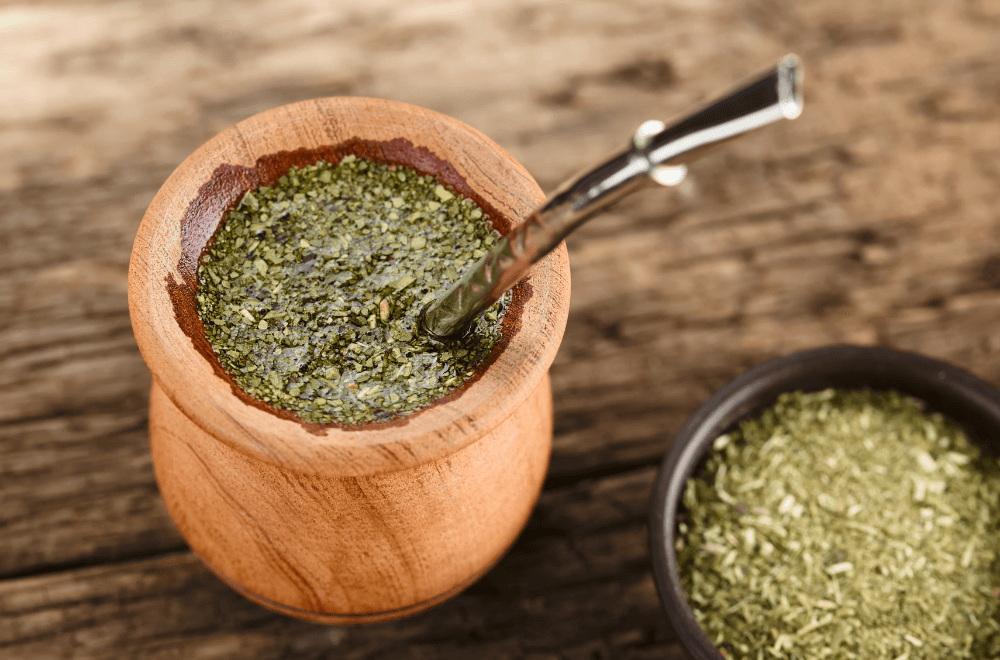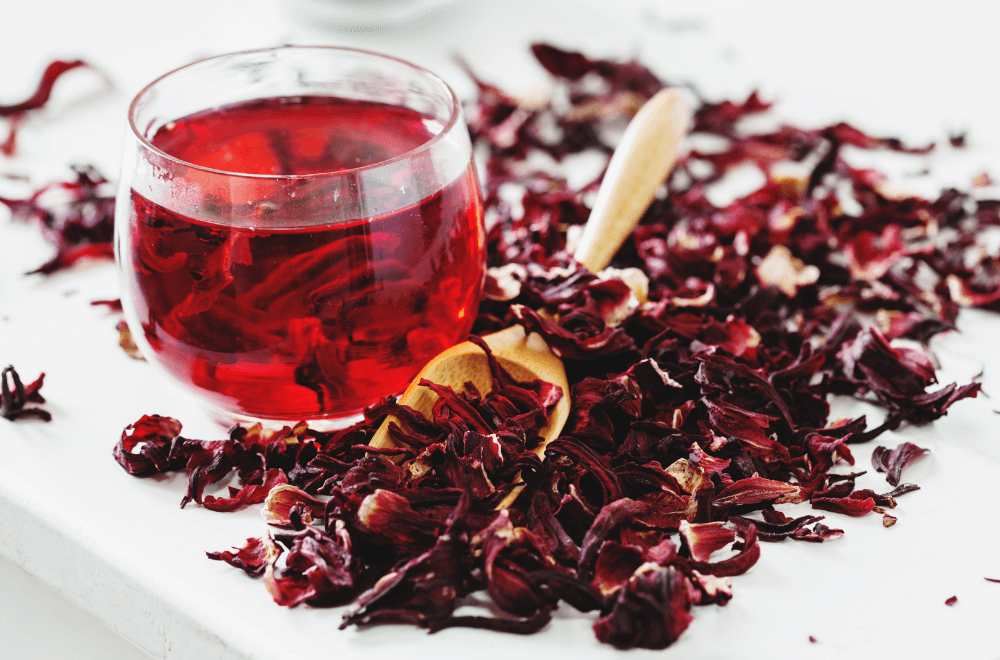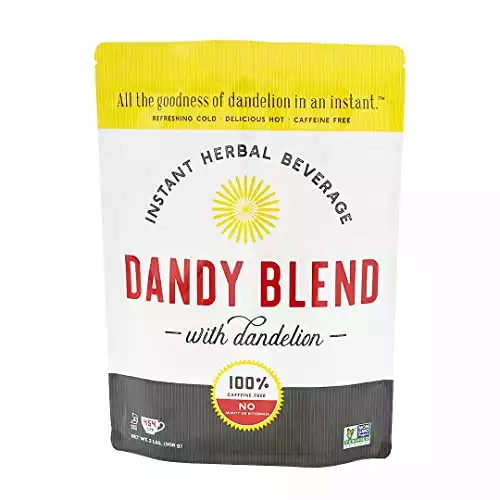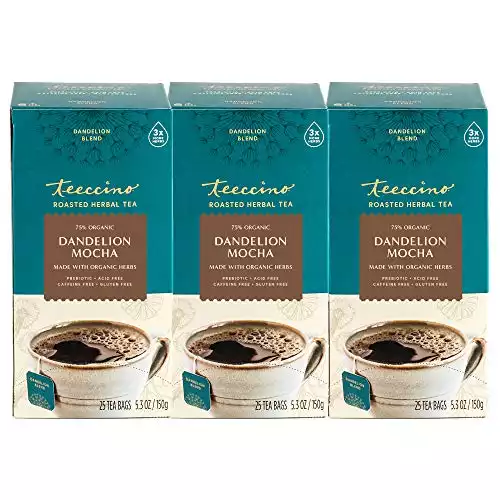Too many cups of Joe can have undesirable side effects on your body. Read on to learn what are the best coffee alternatives to reduce caffeine intake.

I had my fair share of having too much caffeine in the past. I got to the point when I need to have at least 6 to 8 cups a day to prop myself up because of the long working hours. I don’t miss the caffeine tolerance along with the jitters and erratic sleeping patterns it brings.
A cup of coffee has many health benefits as it is rich in antioxidants, but it also has its drawbacks when consumed in high quantities. If you are at this stage, I’d like to give you some of the best coffee alternatives you can try to decrease your caffeine dependence.
- What To Look For In A Coffee Alternative
- How To Pick The Best Coffee Alternative
- 1. Mushroom Coffee
- 2. Chicory Root Coffee
- 3. Dandelion Root Coffee
- 4. Roasted Barley Coffee
- 5. Yerba Mate
- 6. Roasted Grain Beverages
- 7. Herbal Teas
- 8. Rooibos Tea
- 9. Peppermint Tea
- 10. Chamomile Tea
- 11. Hibiscus Tea
- 12. Matcha Tea
- 13. Chai Tea
- 14. Capomo Coffee
What To Look For In A Coffee Alternative
I usually reduce my caffeine intake at least every 4 months or when I start to notice coffee doesn’t work after 5 cups. I turn to these drinks whenever that happens, albeit I do it gradually. Surprisingly, it is effective even in a high-stress work environment.
I recommend starting with matcha or mushroom coffee before gradually switching to caffeine-free options. Look for alternatives that are low in caffeine or caffeine-free. The coffee substitute should be at least accessible, easy to buy, and easy to brew at home or the office. It is a big plus if they offer more health benefits than regular coffee.
How To Pick The Best Coffee Alternative
It’s challenging to quit coffee entirely. If you think you and your body are prepared to go cold turkey, you can proceed to the caffeine-free option. Otherwise, choose a decaf or a drink with relatively low caffeine content.
The drink should also give you an energy boost that isn’t overpowering. There are coffee substitutes best taken in the morning or the evening, so consider when you plan to consume it. It should also be within your budget.
You are sure to miss the coffee’s flavor so having a flavorful option is a big bonus.
1. Mushroom Coffee
This coffee alternative has seen a resurgence during the pandemic but has been around for a long time. While it can be caffeine-free, brands such as Four Sigmatic and MUD\WTR also offer decaf or less caffeine options.
Mainly, the mushrooms mixed with coffee are composed of lion’s mane, chaga, reishi, and cordyceps. These are packed with health benefits and contain adaptogens, interesting compounds that can give you an energy boost once it determines what your body needs. This is the best coffee substitute to consider as it is the closest to your regular cup of Joe in terms of flavor.
Pros
- Tastes like regular coffee
- Comes in different flavors depending on brand
- Packed with health benefits
Cons
- Slightly earthy flavor
- Slightly pricey
- You can also check out our list of the best mushroom coffee brands to avoid a caffeine crash.
2. Chicory Root Coffee
Another great coffee substitute that is totally caffeine-free is this beverage brewed from the chicory root. The drink contains a prebiotic fiber called inulin, which helps the probiotic bacteria in our body to improve gut health and aid in weight loss.
Its energizing effect doesn’t rely on caffeine, but on that refreshing feeling, it gives due to the health benefits it can give to your body. It might taste slightly more bitter, but it does have a pleasant oaky, and nutty taste that works well when turned into a cold brew.
Pros
- Similar to regular coffee
- Less expensive
- Ideal for cold brew
Cons
- A bit more bitter
- Might be unsuitable for pregnant women
3. Dandelion Root Coffee
Dandelion root coffee is a mix of java and tea. Its color is black, but the consistency is a bit thin. Flavor-wise, it has that bitterness but with a tinge of floral and vegetal taste.
Much like the chicory root coffee, it can also aid in improving gut health and liver function.
Brands such as Dandy Blend and Teeccino offer coffee alternatives that contain dandelion root, with the latter releasing different flavors for coffee drinkers.
- Made from the water soluble extracts of barley, rye, chicory roots, beet roots, and dandelion roots.
- Has the consistency of instant coffee and can be served hot, cold, or in your favorite recipe. Simply add water and stir. No tea bags, filters, coffee pot, or French Press needed.
- Used as a coffee substitute or complete replacement for coffee as it tastes like a full bodied cup of coffee for many. No caffeine, acidity, or bitterness. No withdrawal headaches.
- Dandy Blend has been bringing the benefits of dandelion and chicory root to our customers for over 30 years.
- You may have noticed that your bag of Dandy Blend doesn’t have roasted sugar beet root extracts as an ingredient anymore. It’s because we’re weeding it out of our recipe, which means you might still receive a bag that has it...or not! Why you might be asking? The high-quality beet root that we use is no longer available and we’re committed to only serving you the best. It’s still the same bold flavor you know and love, whether you receive a bag with this past or current recipe. Happy sipping!
Pros
- Close to a regular coffee flavor
- Affordable
- Aids in weight-loss and liver health
Cons
- Its slightly floral taste might be off-putting for some
- Might be unsuitable for pregnant women or those who suffer from liver or kidney illness
4. Roasted Barley Coffee
This coffee alternative is perfect for espresso lovers due to its thick crema and its toasty yet light flavor. It is caffeine-free but it is flexible enough to be turned into a latte or a cappuccino when milk is added.
Barley also contains starch, which means the drink is a suitable morning cup. It is also rich in magnesium and potassium, minerals that can improve your cardiovascular health.
Pros
- Flexible coffee substitute
- Rich in protein and fiber content
Cons
- Richness in starch might result to weight increase if not taken moderately
- Might be unsuitable for those who suffer from celiac disease or other digestive illnesses
5. Yerba Mate

This beverage contains a significant amount of caffeine, so it is wise to control the serving portion. Still, it is rich in antioxidants and is considered a superfood because it contains 7 out of 9 essential amino acids plus most of the vitamins and minerals our body requires.
It tastes more robust than a cup of black tea and contains more antioxidants than a green tea. If you are looking for a strong tea or coffee alternative for a morning cup or as a pick-me-up, this might be for you.
Pros
- Loaded with vitamins, minerals, and antioxidants
- Can boost your immune system, as well as physical and cognitive functions
Cons
- Relatively high caffeine content
- Strong bitter flavor might be too overwhelming for some
- Yerba Mate is also a great substitute for energy drinks. Check out our list of the best alternatives to green tea.
6. Roasted Grain Beverages
This substitute is also known as cereal or grain coffee and has similar features with barley coffee. Its powder looks similar to ground coffee beans but has a malty flavor and isn’t that bitter. Since it is rich in dietary fiber and contains carbohydrates, it is also an ideal source of energy.
Pros
- Rich in calcium and dietary fiber
- Light flavor with little to no bitterness
Cons
- Can increase blood sugar when drank excessively
- Not a gluten-free option
7. Herbal Teas
If you are looking for a refreshing alternative that packs a punch of flavor and health benefits, then you should consider herbal teas such as turmeric tea or ashwagandha tea. Both have that robust earthy flavor, with the former having that spicy kick while the latter having a prominent bitter taste.
In general, herbal teas are great sources of vitamins, minerals, and antioxidants while having its own unique taste depending on what plant or herb you are using.
Pros
- Wide range of options to choose from
- Extremely healthy alternative
- Accessible and affordable ingredients
Cons
- Side effects vary depending on ingredient
- Taste can be unappealing to some
8. Rooibos Tea
Rooibos tea is a common coffee or tea alternative made from the red bush plant. This refreshing caffeine-free drink lacks some of the antioxidants found in true teas, but it is rich in quercetin which aids in cardiovascular functions and is found to improve cholesterol levels in the body.
This is also an ideal alternative for those with respiratory ailments and hypertension as its natural properties has a bronchodilatory effect and can lower blood pressure.
Pros
- Perfect for high blood pressure and respiratory ailment sufferers
- Mild sweet flavor can be easily paired with
Cons
- Not suitable for estrogen-dependent cancer patients
9. Peppermint Tea
Peppermint tea can be a refreshing pick-me-up beverage. Its gentle menthol zing can soothe you with every sip as its natural properties can relax your muscles and lower your stress levels. It is even better if you are suffering from headaches due to caffeine withdrawal as it can help alleviate the pain.
Pros
- Caffeine-free, safe-to-drink pain reliever
- Has antibacterial, antiviral, and anti-inflammatory properties
Cons
- Might interact with medications (wise to consult your doctor)
- Not suitable for those with GERD or other digestive illnesses
10. Chamomile Tea
Habitually drinking coffee at night can affect sleeping patterns and can carry over once you start reducing your caffeine. Chamomile tea is one substitute to counteract that because of apigenin, a compound that helps tell your brain to doze off.
A cuppa of this mixed with sweeteners is ideal to lower your stress levels. It gives just enough energy to relax and help you get back to your usual sleeping cycle.
Pros
- Effective stress reliever
- Soporific properties to help with sleep
Cons
- Can induce lightheadedness
- Lacks energy boost for a morning cup
- Not recommended for those who have asthma or other respiratory diseases
11. Hibiscus Tea

Hibiscus tea has a high concentration of vitamin C which can help your immune system. The red tea comes from the Hibiscus sabdariffa flower which is steeped in hot water and is known for its sour taste.
This alternative is ideal if you are quitting caffeine because of hypertension as drinking hibiscus tea daily can lower both systolic and diastolic blood pressure.
Pros
- Controls blood pressure
- High vitamin C content
- Rich in antioxidants
Cons
- Sour and tarty taste can be overwhelming
- Not recommended for those with low blood pressure
12. Matcha Tea
Matcha green tea has higher caffeine than black tea but slightly less than coffee. This makes it a coffee alternative perfect if you are starting to detox. It also has the highest l-theanine compared to other green teas and aids in reducing stress, improving mood, and enhancing cognitive function.
Pros
- Rich in antioxidants, calcium, and other vitamins and minerals
- No jitter side-effect
Cons
- Matcha flavor can be an acquired taste.
- Still high in caffeine content
13. Chai Tea
One of the most flavorful alternatives due to its ingredients consisting of black tea, milk, spices, sugar and usually garnished with cacao powder. If you are skipping chocolate, you can opt for carob powder as an alternative, as it looks and tastes similar.
It carries the health benefits of true teas and provides ample energy to make it as a morning cup.
Pros
- Improves cardiovascular health
- Can lower blood pressure and sugar level (if sweeteners are skipped)
- Boosts physical and cognitive function
Cons
- Spices can be overwhelming
- Too many sweeteners can lead to weight gain
- Dairy-free substitutes should be used if lactose intolerant
14. Capomo Coffee
Coffee alternatives like chicory or barley coffee have been rising in popularity in recent years, but nothing hits the spot quite like Café Capomo. It is made by roasting and grinding the seeds from the Brosimum alicastrum tree. Café Capomo is also easy to brew; you simmer it on the stove for one to two minutes and strain it before serving. Add two to three teaspoons of Capomo coffee per eight ounces of water for the best results.
Café Capomo’s offerings initially delight customers when they’re met with that familiar coffee-like aroma. The taste has been compared to percolator coffee with additional nutty notes. As many coffee lovers try to taper down their caffeine addiction, Capomo coffee is a great choice because it is caffeine-free but still perks you up. It is also acid-free, so you can enjoy a comforting beverage without worrying about heartburn. You can find a classic dark roast product or enjoy flavored offerings like hazelnut, vanilla, turmeric, and caramel.
Pros
- Naturally caffeine-free and nutrient-rich.
- Environmentally friendly due to the resilience of its source tree.
- Versatile use in cooking and beverage making.
Cons
- Distinct taste might not appeal to traditional coffee lovers.
- Limited availability and potentially higher cost.
- Lack of caffeine may not suit those seeking stimulation.
I had a chance to try out all these drinks since I often undergo caffeine detox, especially during my corporate days. Getting advice from friends and other coffee drinkers also provided insights on which coffee substitutes were best. If you found this article helpful, check our guide to coffee sweetener alternatives.


